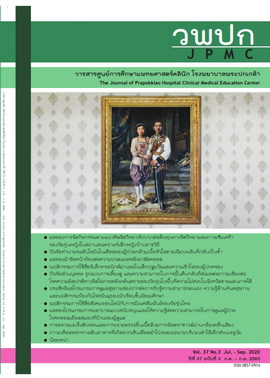Effect of The Supportive-Educative Nursing Program on Capability of Family Caregiver For Caring Post Stroke
Main Article Content
Abstract
Background: Stroke patients who have recovered from the critical period and are undergoing the recovery period at home are highly dependent on caregivers. Therefore, the caregiver’s ability is essential for the patient’s potential recovery and prevention of disability complications.
Objectives: To determine the effectiveness of the supportive educative nursing programme on the capability of the family caregivers, self-care ability, and complications in post-stroke patients.
Materials and Methods: This research was a quasi-experimental study of two groups with a pre-post intervention design. The intervention group comprised newly diagnosed stroke patients and their main caregivers. There were 28 participants in each intervention and comparison group. The experimental group received supportive and educative nursing care in a stroke rehabilitation programme, which applied a self-care theory, disease literacy, and two sessions of home visits and telephone counselling over a period of eight weeks. The data were collected from questionnaires, a guided interview, and direct observation of any disease complications at the baseline and post-intervention period. Data analysis was performed by descriptive statistics, and the hypothesis was tested by using an independent t-test and paired t-test.
Results: The results revealed that the main caregiver in the experimental group demonstrated a higher caregiver ability and confidence score in the post-intervention period than the pre-intervention period that displayed statistical significance (p-value < 0.01). The mean difference of the caring practices score among the intervention group at the post-intervention period was also higher than the baseline score and the comparison group that displayed statistical significance (p-value < 0.01). In addition, the self-care ability in stroke patients in the experimental group was statistically significantly higher than the comparison group, and the incidence of stroke complications was also lower than the baseline period and the comparison group that displayed statistical significance. (p-value < 0.05).
Conclusion: This supportive educative nursing programme was effective, and could be applied in the strengthening of the caregivers’ capability in stroke patient home rehabilitation.
Article Details
References
Division of Non Communicable Diseases. The number and morbidity rate of stroke patient (I60-I69) per 100,000 population (including all diagnosis) 2007-2014 classified by province, health service area and big picture of Thailand (including Bangkok) [Internet]. 2015 [cited 2019 Oct 3]. Available from: http://www.thaincd.com/2016/mission/documents.php?tid=32&gid=1-020&searchText=หลอดเลือด+สมอง+I60-I69
Baumann M, Peck S, Collins C, Eades G. The meaning and value of taking part in a person-centred arts programme to hospital-based stroke patients: Findings from a qualitative study. Disabil Rehabil 2013; 35:244–56.
Korpershoek C, van der Bijl J, Hafsteinsdottir TB. Self-efficacy and its influence on recovery of patients with stroke: a systematic review. J Adv Nurs 2011; 67:1876-94.
Oupra R, Ruengkhome C, Wongpalee J, Kantawong E. Stroke caregiver care giving experience. Rajabhat Journal of Sciences, Humanities & Social Sciences 2011;12(2):50-9.
National Institute of Neurological Disorder and Stroke. Preventing stroke [Internet]. 2014 [cited 2016 Aug 25]. Available from: https://catalog.ninds.nih.gov/pubstatic//15-3440B/15-3440B.pdf.
Orem DE. Nursing: concept of practice. 4th ed. St Louis: Mosby Year Book;1991.
Sanghuachang W. Effects of education program using group process and telephone follow up on stroke prevention knowledge and practice in elderly with chronic illness. J Prapokklao Hosp Clin Med Educat Center 2013; 30:260-73.
Cohen J. A power primer. Psychol Bul 1992; 112:155-9.
Suchawadee Senasana; Patcharee Komjakraphan; Sangarun Isaramalai. Development of the Home-Based Skill Training Program for Caregivers of Stroke Patients. JPMAT [Internet]. 7(2):212-2. Available from: https://he01.tci-thaijo.org/index.php/JPMAT/article/view/128737
Collin C, Wade DT, Davies S, Horne V. The Barthel ADL index: a reliability study. Int Disabil Stud 1988;10:61-3.

